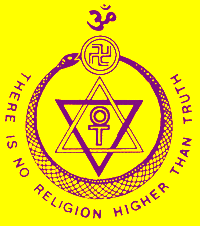A FREE INTRO TO THEOSOPHY

An Outline
of Theosophy
By
Charles
Webster Leadbeater

The
Constitution of Man
The astounding practical materialism to which we have been reduced in
this country can hardly be more clearly shown than it is by the expressions
that we employ in common life. We speak quite ordinarily of man as having a
soul, of “saving” our souls, and so on, evidently regarding the physical body
as the real man and the soul as a mere appanage, a vague something to be
considered as
property of the body.
With an idea so little defined as this, it can hardly be a matter of
surprise that many people go a little further along the same lines, and doubt
whether
this vague something exists at all. So it would seem that the ordinary
man is very often quite uncertain whether he possesses a soul or not; still
less does
he know that the soul is immortal.
That he should remain in this pitiable condition of ignorance seems
strange, for there is a very great deal of evidence available even in the outer
world, to show that man has an existence quite apart
from his body, capable of being carried on at a distance from it while
it is living, and entirely without it when it is dead.
Until we have entirely rid ourselves of this extraordinary delusion that
the body is the man, it is quite impossible that we should at all appreciate
the real facts of the case. A little investigation immediately shows us that
the body is only a vehicle by means of which the man manifests himself in
connection with this particular type of gross matter out of which our visible
world is built.
Furthermore, it shows that other and subtler types of matter exist – not
only the ether admitted by modern science as interpenetrating all known
substances, but other types of matter which interpenetrate ether in turn, and
are as much
finer than ether as it is than solid matter. The question will naturally
occur to the reader as to how it will be possible for man to become conscious
of the existence of types of matter so wonderfully fine, so minutely
subdivided. The answer is that he can become conscious of them in the same way
as he becomes conscious of the lower matter – by receiving vibrations from
them.
And he is enabled to receive vibrations from them by reason of the fact
that he possesses matter of these finer types as part of himself – that just as
his body of dense matter is his vehicle for perceiving and communicating with
the world of dense matter, so does the finer matter within him constitute for
him a vehicle by means of which he can perceive and communicate with the world
of finer matter which is imperceptible to the grosser physical senses.
This is by no means a new idea. It will be
remembered that St. Paul remarks that “there is a natural body, and
there is a spiritual body,” and that he furthermore refers to both the soul and
the spirit in man, by no means employing the two synonymously, as is so often
ignorantly done at the present day. It speedily becomes evident that man is a
far more complex being than is ordinarily supposed; that not only is he a
spirit within a soul but that this soul has various vehicles of different
degrees of density, the physical body being only one, and the lowest of them.
These various vehicles may all be described as bodies in relation to
their respective levels of matter. It might be said that there exist around us
a series of worlds one within the other (by inter-penetration), and that man
possesses a body for each of these worlds, by means of which he may observe it
and live in it. He learns by degrees how to use these various bodies, and in
that way gains a much more complete idea of the great complex world in which he
lives; for all these other inner worlds are in reality still part of it.
In this way he comes to understand very many things which before seemed
mysterious to him; he ceases to identify himself with his bodies, and learns
that they are only vestures which he may put off and resume or change without
being himself in the least affected thereby. Once more we must repeat that all
this by no means metaphysical speculation or pious opinion, but definite
scientific fact thoroughly well known experimentally to those who have
studied
Theosophy.
Strange as it may seem to many to find precise statements taking the
place of hypothesis upon questions such as these, I am speaking here of nothing
that is not known by direct and constantly repeated observation to a large
number of
students. Assuredly “we know whereof we speak”, not by faith but by
experiment, and therefore we speak with confidence. To these inner worlds or
different levels of nature we usually give the name of planes. We speak of the
visible world as “the physical plane”, though under that name we include also
the gases and various grades of ether.
To the next stage of materiality the name of “the astral plane” was
given by the medieval alchemists (who were well aware of its existence), and we
have adopted their title. Within this exists another world of still finer
matter, of which we speak as “the mental plane”, because of its matter is
composed what is commonly called the mind in man. There are other still higher
planes, but I need not trouble the reader with designations for them, since we
are at present dealing only with man’s manifestation in the lower worlds.
It must always be born in mind that all these worlds are in no way
removed from us in space. In fact, they all occupy exactly the same space, and
are all equally about us always. At the moment our consciousness is focused in
and working through our physical brain, and thus we are conscious only of the
physical world, and not even of the whole of that.
But we have only to learn to focus that consciousness in one of these
higher vehicles, and at once the physical fades from our view, and we see instead the world of matter which corresponds
to the vehicle used.
Recollect that all matter is in essence the same. Astral matter does not
differ in its nature from physical matter any more than ice differs in its
nature from steam. It is simply the same thing in a different condition.
Physical matter may become astral, or astral may become mental, if only it be
sufficiently subdivided, and caused to vibrate with the proper degree of
rapidity.
For more info on Theosophy
Try these

Cardiff
Theosophical Society meetings are informal
and there’s always
a cup of tea afterwards
The Cardiff Theosophical Society Website
The National Wales Theosophy Website
Theosophy
Wales Youtube Channel
Ten Benefits of Studying the Blavatskyan
Theosophical Teachings
Studying
the Blavatskyan Theosophical teachings offers numerous benefits that can
greatly enrich one's understanding of spirituality, philosophy, and the nature
of reality. Theosophy, as defined by the
writings of Helena Petrovna Blavatsky, has had a profound impact on the
spiritual and philosophical landscape of the modern world. Blavatsky's teachings
draw from a wide range of religious and philosophical traditions, including
Hinduism, Buddhism, and Western esotericism, and present a comprehensive
worldview that addresses fundamental questions about existence, consciousness,
and the cosmos.
Here
are ten benefits of studying the Blavatskyan Theosophical Teachings
1.
Exploration of Esoteric Wisdom
One
of the primary benefits of studying the Blavatskyan Theosophical teachings is the
opportunity to explore esoteric wisdom that is often not readily accessible in
mainstream religious or philosophical traditions. Blavatsky's writings delve
into the esoteric teachings of ancient cultures and mystery schools, shedding
light on profound spiritual truths that have been passed down through the ages.
By delving into these esoteric teachings, students of Theosophy can gain
insights into the nature of consciousness, the structure of the cosmos, and the
evolution of the soul or immortal self.
2.
Synthesis of Eastern and Western Philosophy
Blavatsky's
Theosophical teachings synthesize elements of Eastern and Western philosophy,
offering a comprehensive framework that integrates concepts from diverse
cultural and religious traditions. This synthesis provides students with a
broader perspective on philosophical and spiritual thought, allowing them to
see the underlying unity of seemingly disparate belief systems. By studying
Theosophy, individuals can gain a deeper appreciation for the universal principles
that underlie all wisdom traditions, fostering a sense of unity and
interconnectedness with the world's spiritual heritage.
3.
Understanding of Universal Brotherhood
Central
to Blavatsky's Theosophical teachings is the principle of universal brotherhood,
which emphasizes the essential unity of all beings and the interconnectedness
of life. By studying Theosophy, individuals can develop a profound
understanding of the interconnected nature of existence, recognizing that all
living beings are fundamentally linked and that compassion and empathy are
essential for the evolution of humanity. This understanding can lead to a
greater sense of empathy, kindness, and social responsibility, fostering a more
harmonious and compassionate society.
4.
Insight into the Nature of Reality
The
Blavatskyan Theosophical teachings offer profound insights into the nature of
reality, consciousness, and the unseen dimensions of existence. Through the
study of Theosophy, individuals can explore concepts such as the multi-dimensional
nature of the universe, the existence of subtle energy realms, and the
interconnectedness of the material and spiritual planes. This exploration can
lead to a deeper understanding of the nature of reality beyond the limitations
of the physical senses, opening up new vistas of perception and understanding.
5.
Personal Spiritual Growth
Studying
the Theosophical teachings can be a transformative journey that facilitates
personal spiritual growth and self-discovery. Blavatsky's writings offer practical
guidance for inner development, including meditation practices, ethical
principles, and the cultivation of spiritual virtues. By applying these
teachings to their lives, individuals can experience profound personal
transformation, leading to greater self-awareness, inner peace, and a sense of
purpose and meaning.
6.
Ethical and Moral Guidance
The
Theosophical teachings provide a comprehensive ethical and moral framework that
can guide individuals in their personal and social interactions. Blavatsky emphasizes
the importance of ethical conduct, altruism, and the pursuit of wisdom,
offering practical guidance for leading a virtuous and meaningful life. By
studying Theosophy, individuals can gain clarity on moral issues, cultivate a
sense of ethical responsibility, and contribute to the greater good of
humanity.
7.
Appreciation of Comparative Religion
The
study of Theosophy encourages an appreciation of comparative religion and the
underlying unity of religious and spiritual traditions. Blavatsky's writings
explore the common threads that run through the world's religions, highlighting
universal spiritual principles that transcend cultural and historical
boundaries. By gaining a deeper understanding of comparative religion through
Theosophy, individuals can develop a more inclusive and pluralistic
perspective, fostering interfaith harmony and mutual respect.
8.
Intellectual Stimulation
The
Theosophical teachings offer a rich and intellectually stimulating framework
for exploring profound philosophical and metaphysical concepts. Blavatsky's
writings encompass a wide range of subjects, including cosmology, metaphysics,
ancient wisdom, and the evolution of consciousness, providing ample material
for intellectual inquiry and contemplation. By engaging with these teachings,
individuals can expand their intellectual horizons, develop critical thinking
skills, and gain a deeper understanding of the fundamental questions that have
intrigued philosophers and mystics throughout history.
9.
Healing and Reconciliation
The
Theosophical teachings offer insights into the nature of healing and
reconciliation, both on a personal and collective level. Blavatsky's writings
delve into the esoteric principles of healing, the nature of disease, and the
interconnectedness of mind, body, and spirit. By studying Theosophy,
individuals can gain a deeper understanding of holistic healing modalities, the
power of the mind in influencing health, and the potential for spiritual
transformation through the healing process. Furthermore, the Theosophical
emphasis on universal brotherhood and compassion can contribute to the
reconciliation of divisions and conflicts within society, fostering a more
harmonious and peaceful world.
10.
Contribution to Global Transformation
Finally,
studying the Blavatskyan Theosophical teachings can empower individuals to
contribute to the ongoing global transformation towards a more enlightened and
compassionate world. Blavatsky's vision of a spiritually awakened humanity,
working towards the betterment of all beings, inspires individuals to engage in
positive action and service to humanity. By embodying the principles of
Theosophy in their lives, individuals can become agents of positive change,
working towards the realization of a more just, peaceful, and sustainable
world.
In
summary, the study of the Blavatskyan Theosophical teachings offers a wide
range of benefits, ranging from personal spiritual growth to the potential for
global transformation. By delving into the esoteric wisdom, ethical principles,
and philosophical insights of Theosophy, individuals can expand their
understanding of the nature of reality, cultivate compassion and empathy, and
contribute to the evolution of humanity towards a more harmonious and
enlightened future. As the Theosophical teachings continue to inspire and guide
seekers of truth and wisdom, their profound impact on individuals and society
is likely to endure for generations to come.
Dave’s Streetwise Theosophy Boards
This is for everybody not just people in Wales
Theosophy Cardiff’s Instant Guide to Theosophy
General pages about Wales, Welsh History
and The History of Theosophy in Wales
Teosofia en Cardiff (Página en Español)
One Liners & Quick Explanations
The Most Basic Theosophy Website in the Universe
If you run a Theosophy Study Group you can use
this as an introductory handout
The
South of Heaven Guide to
Theosophy and Devachan
The preparation of this Website
The Spiritual Home of Urban Theosophy
The Earth Base for Evolutionary Theosophy
Classic Introductory Theosophy Text
A Text Book of Theosophy By C
What Theosophy Is From the Absolute to Man
The Formation of a Solar System The Evolution of Life
The Constitution of Man After Death Reincarnation
The Purpose of Life The Planetary Chains
The Result of Theosophical Study
An Outstanding
Introduction to Theosophy
By a student of Katherine
Tingley
Elementary Theosophy Who is the Man? Body and Soul
Body, Soul and Spirit Reincarnation Karma
Preface to the American Edition Introduction
Occultism and its Adepts The Theosophical Society
First Occult Experiences Teachings of Occult Philosophy
Later Occult Phenomena Appendix
Newcastle Emlyn (Castell Newydd Emlyn) is on the
Cardiganshire Carmarthenshire border
Newcastle Emlyn (Castell Newydd Emlyn) is on the
Cardiganshire Carmarthenshire border
Preface
Theosophy and the Masters General Principles
The Earth Chain Body and Astral Body Kama – Desire
Manas Of Reincarnation Reincarnation Continued
Karma Kama Loka
Devachan
Cycles
Arguments Supporting Reincarnation
Differentiation Of Species Missing Links
Psychic Laws, Forces, and Phenomena
Psychic Phenomena and Spiritualism
Karma Fundamental Principles Laws: Natural and Man-Made The Law of Laws
The Eternal Now
Succession
Causation The Laws of Nature A Lesson of The Law
Karma Does Not Crush Apply This Law
Man in The Three Worlds Understand The Truth
Man and His Surroundings The Three Fates
The Pair of Triplets Thought, The Builder
Practical Meditation Will and Desire
The Mastery of Desire Two Other Points
The Third Thread Perfect Justice
Our Environment
Our Kith and Kin Our Nation
The Light for a Good Man Knowledge of Law The Opposing Schools
The More Modern View Self-Examination Out of the Past
Old Friendships
We Grow By Giving Collective Karma Family Karma
National Karma
India’s Karma
National Disasters
Wales Theosophy Links Summary
Hey Look! Theosophy in Cardiff
Try these if you are looking for a
local Theosophy Group or Centre
UK Listing of Theosophical Groups
Please tell us about your UK Theosophy Group
Worldwide Directory of Theosophical Links

General pages
about Wales, Welsh History
and The History
of Theosophy in Wales
Wales is a
Principality within the United Kingdom
and has an eastern
border with England. The land
area is just over
8,000 square miles. Snowdon in
North Wales is the
highest mountain at 3,650 feet.
The coastline is
almost 750 miles long. The population
of Wales as at the 2001 census is 2,946,200.
__________________________________________
into categories and presented according to relevance
of website.

